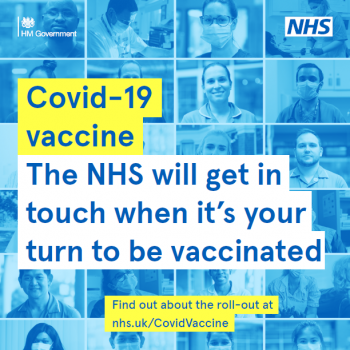Vaccines are the way out of this pandemic. An effective vaccine is the best way to protect people from coronavirus. Following extensive trials, two safe and effective COVID-19 vaccines have been approved in the UK and the NHS COVID-19 vaccination programme has started in Hull.
An independent group of experts (Joint Committee of Vaccination and Immunisation) has recommended that the NHS first offers these vaccines to those at highest risk of catching the disease and of suffering serious complications or dying from COVID-19.
Read the latest JCVI advice on priority groups for the COVID-19 vaccination on GOV.UK
Based on current forecasts, by late Spring it should be possible to offer a vaccine to all those people that the JCVI have said would benefit most. In line with the JCVI’s prioritisation, for now this means continuing to vaccinate people aged 70 and over, care home residents and staff, as well as widening out the offer to frontline health and social care staff.
This poster shows the priority groups for COVID vaccine in order of priority
Over the coming weeks we will continue to build capacity across the system to offer more vaccinations with additional local vaccination services, hospital hubs and vaccination centres coming on-line. However, the exact weekly roll-out of new sites and vaccinators will be largely shaped by the vaccine supply schedule from the two manufacturers. This is the biggest vaccination programme the NHS has ever undertaken. It is a huge challenge, and there will be bumps in the road.
How will I get my vaccine?

Until now, the NHS asked people not to contact them about their COVID vaccination and wait until they are approached. This remains the case for most people, but local NHS services are encouraging people in priority cohorts 1-4 (over 70s and those on the shielded patient list) to contact the NHS to book their appointment to ensure everyone in this group is offered the vaccine by mid-February.
Eligible people can book their appointment by contacting the national booking service at www.nhs.uk/covid-vaccination. Those who cannot do it online can call a free 119 number, anytime between 7am and 11pm seven days a week. The national system allows patients to pick a convenient location and time.
It’s important to note that if someone receives a letter from the NHS to book with the national system, and they already have an appointment booked with their local GP practice, then please ignore the letter and keep the existing appointment.
It is also important that anyone who has had the vaccine continues to follow government guidance on social distancing and wearing a mask as well as the additional measures in place where they live.
Why you have to wait for your COVID-19 vaccine
People most at risk from the complications of COVID-19 are being offered the vaccine first. Download the guidance explaining why you have to wait for your turn.
Information about the second dose of the vaccine
Prioritising the first doses of vaccine for as many people as possible on the priority list will protect the greatest number of at risk people overall in the shortest possible time.
The MHRA has authorised the Oxford/AstraZeneca vaccine on a two dose schedule, with the second dose to be given after 4 weeks but within 12 weeks of the first. Following a review of clinical evidence and latest public health data, the JCVI and the Department for Health and Social Care have also updated guidance for the NHS on the second dose for the Pfizer/BioNTech vaccine. It recommends that the second dose of the Pfizer/BioNTech vaccine will also be offered between 3 and 12 weeks apart.
Avoiding fraud
To protect yourself and your family members from fraud and criminals please remember :
- The vaccine is only available on the NHS for free to people in priority groups, and the NHS will contact you when it is your turn. Anyone offering a paid-for vaccine is committing a crime and should be reported to the Police online or by calling 112.
- The NHS will never ask you to press a button on your keypad or send a text to confirm you want the vaccine, and never ask for payment or for your bank details.
- At the moment we are also not making house calls to deliver or discuss the vaccine. Anyone offering this now is committing a crime.
- If you receive a call you believe to be fraudulent, hang up. If you believe you have been the victim of fraud or identity theft you should report this directly to Action Fraud on 0300 123 2040. Where the victim is vulnerable, and particularly if you are worried that someone has or might come to your house, report it to the Police online or by calling 101.
Other Frequently Asked Questions
Local NHS organisations have put together a list of Frequently Asked Questions about the vaccination programme. Read the most commonly asked vaccine questions and answers on the East Riding CCG website. (These FAQs cover Hull and the whole Humber, Coast and Vale area).
For more information about the Coronavirus (COVID-19) vaccine, visit the NHS website.
Updated 9 February 2021

